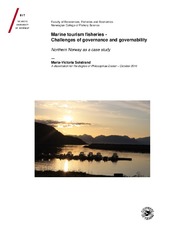Marine tourism fisheries - Challenges of governance and governability Northern Norway as a case study
Permanent lenke
https://hdl.handle.net/10037/7001Åpne
Thesis introduction and appendix (PDF)
Maria-Victoria Solstrand: ‘Institutional challenges for effective governance of consumptive wildlife tourism - Case studies of marine angling tourism in Iceland and Norway’, manuscript, later published in Maritime Studies (2015) 14:4 and available at http://dx.doi.org/10.1186/s40152-015-0021-1 (PDF)
Dato
2014-12-17Type
Doctoral thesisDoktorgradsavhandling
Forfatter
Solstrand, Maria-VictoriaSammendrag
The research focus for this dissertation is marine tourism fisheries – a sector rapidly growing in popularity in Northern Norway. Data from this research study suggest that the ecological impacts may be more significant than previously thought. As such, it is suggested that marine tourism fisheries be considered separately from recreational fishing, and alongside commercial-scale and small-scale fisheries with regard to fish stock impacts and management.
The overarching research question being answered with this dissertation is: What are the critical components of a governance strategy that would support a sustainable path of development for marine tourism fisheries in Norway?
To answer this question, a case study analysis was conducted of marine angling tourism (MAT) in Northern Norway — a popular form of consumptive wildlife tourism in the Arctic fjords.
MAT offers great potential to contribute to regional development of the remote coastal regions of Norway; but it is generating conflict, primarily as the result of tourists’ non-compliance with Norway’s regulations.
This dissertation explores in depth why the fish as a natural resource cannot be managed separately, but must be managed with consideration of MAT as a complex socio-ecological system. Sustainable tourism development for this form of consumptive wildlife tourism requires that a management strategy find balance between prioritizing the mitigation of multi-stakeholder conflicts; providing sufficient ecological data to protect vulnerable fish stocks; and enhancing the tourist experience such that tourists will return and recommend.
In order to determine how such balance might be achieved, the governance and governability of MAT in Norway are examined — breaking down governance into smaller, more workable segments. The theoretical models chosen as the lenses through which to explore and interpret the complex relationships within MAT as a socio-ecological system were drawn from the principles of interactive governance theory, and institutional theory applied to common pool resources.
Elements from Iceland’s system of governance for MAT are used to highlight areas of consideration for inclusion in a modified governance strategy in Norway (Articles 1 and 3). Article 2 quantitatively examines tourist behaviour with regard to non-compliance, and the implications for natural resource management. Article 3 presents a modified model for analysing institutional inter-dynamics of a complex socio-ecological system that includes four institutional pillars.
Among the critical components of a governance strategy that would support a sustainable path of development are included: creating regulations that match how MAT functions in practice; activating the tourists’ participatory role to collect vital catch statistics in support of ecosystem-based management; consideration of the communities as stakeholders; and improving conflict mitigation mechanisms.
With greater understanding of how MAT functions, comes the possibility of finding solutions for how to more effectively govern marine tourism fisheries in Norway.
Beskrivelse
Papers number 1 and 2 of this thesis are not available in Munin:
1. Maria-Victoria Solstrand: ‘Marine angling tourism in Norway and Iceland: Finding balance in management policy for sustainability’, Natural Resources Forum 37 (2013) 113–126. Available at http://dx.doi.org/10.1111/1477-8947.12006
2. Maria-Victoria Solstrand, Thomas Gressnes: ‘Marine angling tourist behavior, non-compliance, and implications for natural resource management’,Tourism Management, 45 (2014) 59-70. Available at http://dx.doi.org/10.1016/j.tourman.2014.03.014
1. Maria-Victoria Solstrand: ‘Marine angling tourism in Norway and Iceland: Finding balance in management policy for sustainability’, Natural Resources Forum 37 (2013) 113–126. Available at http://dx.doi.org/10.1111/1477-8947.12006
2. Maria-Victoria Solstrand, Thomas Gressnes: ‘Marine angling tourist behavior, non-compliance, and implications for natural resource management’,Tourism Management, 45 (2014) 59-70. Available at http://dx.doi.org/10.1016/j.tourman.2014.03.014
Forlag
UiT The Arctic University of NorwayUiT Norges arktiske universitet
Metadata
Vis full innførselSamlinger
Copyright 2014 The Author(s)
Følgende lisensfil er knyttet til denne innførselen:
Med mindre det står noe annet, er denne innførselens lisens beskrevet som Attribution-NonCommercial-ShareAlike 3.0 Unported (CC BY-NC-SA 3.0)
Relaterte innførsler
Viser innførsler relatert til tittel, forfatter og emneord.
-
Japanese consumption practices of tourism. An exploratory study of the “hows” and “whys” of Japanese tourists’ consumption of tourism and nature-based tourism
Krag, Christoffer Wanga (Master thesis; Mastergradsoppgave, 2014-11-30)The main purpose of this study is to explore Japanese consumption practices of tourism asking how and why Japanese tourists consume tourism. Additionally, the study attempts to explore the relation that the Japanese have towards nature, at the same time as it explores the possibility that there are some exclusive reasons as to why they wish to visit nature in a tourism context. In relation to this, ... -
Indigenous cultural tourism in Chitwan, Nepal: Obtaining sustainability in Tharu culture and tourism
Koirala, Ishwar (Master thesis; Mastergradsoppgave, 2016-06-01)Cultural heritage is one of the most important elements of tourism. We can see remarkable efforts of concerned people and agencies to develop tourism potential and to discover new cultural sites in a number of places. Even the cultures of remote and less-discovered cultural sites are growing attraction to tourists. On one hand, people are trying to develop tourism on bases of cultural heritage but, ... -
Indigenous people, tourism and development? The San people's involvement in community-based tourism
Haug, Margrethe (Master thesis; Mastergradsoppgave, 2007-06-13)The overall theme of this thesis is the relationship between tourism and its industry, and indigenous people struggling for sustainable development and cultural recognition. A prevailing assumption has been that tourism, as a modern institution, will change and perhaps even destroy traditional cultures in an effort to turn them into a commercial product. Questioning this assumption, this thesis ...


 English
English norsk
norsk



